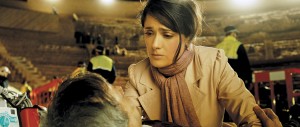TRIBECA REVIEW: ‘As Luck Would Have It’

Director Alex de la Iglesia loves cinematic oddity. Last year’s The Last Circus is a strange head trip that follows an overweight clown and his revenge against a man who abuses women. It descends into insanity, but is definitely worth the ride. At this year’s Tribeca Film Festival, Iglesia’s latest movie follows a similar path of absurdity, but it doesn’t quite grab the audience’s attention.
As Luck Would Have It follows Roberto (José Mota), an everyman facing economic uncertainty. He has a loving wife (Salma Hayek) and two children getting ready for college. The problem for this advertising executive is that he hasn’t worked in two years. Opportunities have dried up, bills have gone unpaid and any goodwill he had with old colleagues doesn’t seem to exist anymore.
Roberto leaves the house for what proves to be another pointless interview. Unable to seal the deal and embarrassed to face his wife again, he inexplicably heads to Cartagena to find the hotel where he spent his honeymoon. The building has been demolished, and in its place is a brand-new museum that’s about to unveil a carefully excavated Roman amphitheater.
Stay with me. It gets stranger.
After slipping past security, Roberto ends up taking a ride on a crane over the amphitheater and then falling many feet onto a steel grid. When he opens his eyes after the fall, he’s expecting to be dead or injured. The curious thing is that he doesn’t feel any pain. There’s no blood, and everything seems to be OK. It’s only when he tries moving his head that he realizes a steel rod has shot through his brain. If he moves, he’ll probably die.
Most people under similar circumstances (and who hasn’t had a steel rod lodged in their brain?) would call their family, maybe a priest, and prepare for certain death. Roberto decides to cash in on the unusual accident. Thinking like a child stuck in a well or a Chilean miner stuck in a mine, he generates an advertising hoopla over his near-fatal incident. Soon, the TV cameras are broadcasting live from the museum and stations are clamoring at the chance to interview the man with the rod in his head.
Eventually, Luisa (Hayek) turns up and tries to smack some sense into her husband. But with dollar signs in his eyes, it may be too late to save Roberto.
As Luck Would Have It is the definition of absurd, and there are several scenes that cleverly play on that absurdity. There’s not one moment that’s supposed to be taken seriously. After all, this fake plot is too far-fetched to be believed. It may serve as a nice piece of social commentary on our news-hyped world, but it would never actually happen like this.
The problem with the movie is not so much that it’s an experiment in oddity. The problem is that after the central plot point is set up, it becomes a tedious affair. Everything that Iglesia wants to say about Roberto and his predicament is achieved almost right away. He spends the last 30 minutes tying up loose ends and trying to put a bow on a movie that doesn’t need much catharsis.
If there were more laughs, it would be much easier to appreciate As Luck Would Have It. The comedic element is one of the many saving graces of the far superior The Last Circus.
The acting, especially from Mota, is dedicated (no smirks among the cast), although the plot overshadows any individual performance. Iglesia, working off a script by Randy Feldman, has crafted a story so strange that it destroys everything in its path. That’s all fine and good, but only if the tale is worth telling in the first place.
By John Soltes / Publisher / John@HollywoodSoapbox.com




